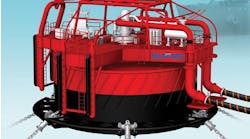"Elastic wave" smart pig adapted for pipes up to 48-in. diameter
PII's Elastic Wave Vehicle pipeline inspection device.
- Grey-scale view of scanned data highlighting pipe anomalies. [5,439 bytes]
Originally formed in 1974 as part of the British Gas Research & Technology division, Pipeline Integrity International was launched as a separate business unit in 1994. With offices in Houston, Singapore and Buenos Aires, PII currently inspects in excess of 20,000 km of pipelines every year.
In March of this year, PII joined forces with the US Gas Research Institute, the Canadian Energy Pipeline Association, and PRC International to form a $5.3 million joint venture to adapt its Elastic Wave Vehicle pipeline inspection device, allowing inspection of a wider range of gas transmission pipes.
The new venture will develop two additional devices: one for 24-in. diameter pipe with the ability to be re-sized for pipe sizes of 20-30 in., and one for 24-in. diameter lines, able to re-size for pipe sizes of 32-48 in. in diameter. With prototypes currently being designed and built, file testing is scheduled to begin in 1998.
PII believes that new sensor technologies such as its elastic wave measurement system will allow the industry to scrutinize a broader range of possible defects. The Elastic Wave Vehicle was the first "smart pig" to use ultrasound technology to inspect pipelines for defects due to stress corrosion cracking (SCC), where tiny cracks form on the surface of buried steel pipelines. Since elastic wave technology can detect SCC without digging up the pipe, pipeline operators can plan for safe, cost-effective repair work.
According to sales and marketing manager Tom Sowerby, PII now commands around 45% of the worldwide pipeline inspection market, with a greater share of the European market. "Being part of British Gas undoubtedly helped us to penetrate markets around the world as we benefited from its reputation for high quality engineering. BG operates 18,000 km of pipeline through Transco and we do all of its inspection work which we have gained through competitive tendering."
Earlier this summer, PII strengthened its portfolio of services by acquiring Aberdeen-based Tecnomarine Systems which develops innovative products for pipeline construction, intervention, and repair. "It's early days yet" says Sowerby, "but we are using the office in Aberdeen as a focal point for offshore inspection, since Tecnomarine has good openings in this market."
A major part of PII's success is due to the comprehensive data analysis it carries out after pipeline inspections. The company has made significant investment in this area through equipment and specialized operator training. One of the key aspects of this analysis is to produce grey-scale views of the data which graphically highlights any anomalies in the pipe. In 1993 PII set the industry standard for computerized manipulation of large quantities of data generated by high resolution inspections by developing PipeVision, a flexible PC reporting software package designed specifically for customers to use in-house. Since then, the software has been further developed and the Version 4.0 Microsoft Windows-based software now includes Feature Report Generator, a reporting facility with specific report generation engines pre-built into the software.
Copyright 1997 Oil & Gas Journal. All Rights Reserved.


